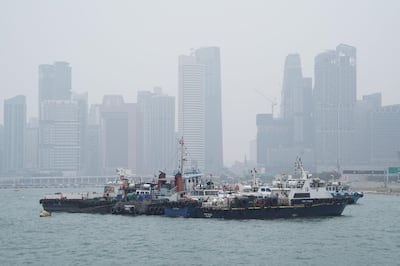After the UN gathering on Monday, at which world leaders were admonished by 16-year-old activist Greta Thunberg – a speech that has since been watched by millions – it would be hard to see how the issue of climate change and mankind's urgent need to take responsibility for the environment could be any more high profile. Every day there is news of concern, whether it be of retreating ice caps, cities and island nations at risk from rising sea levels, or of the reach of microplastic pollution.
Addressing the summit called by UN secretary general Antonio Guterres, Hollywood actor Harrison Ford made clear that crisis is already upon us. He said: "When a room in your house is on fire, you don't say: 'There is a fire in a room in my house.' You say: 'My house is on fire,' and we only have one house."
Mr Ford could have been speaking figuratively. In fact, he meant his words literally. For "our house" is indeed on fire. It is not just the Brazilian Amazon, the so-called lungs of our planet, that is burning, producing clouds of smoke that can be seen from space. Millions of hectares in Bolivia have gone up in flames too – although you might not have heard much about it – while the outside world has been even slower to recognise the devastation caused by fires in Indonesia on the islands of Sumatra and Borneo. The resultant air pollution is so bad that one of Indonesia's provinces – Riau – has declared a state of emergency. Neighbouring Malaysia is airlifting its citizens in the area back home.
Other countries such as India also suffer repeatedly from large-scale forest conflagration, which can sometimes be attributable to parched weather conditions but is often a cheap – and illegal – way for landowners to clear areas for agricultural cultivation.
These are regular occurrences, yet the world is so far from taking the steps necessary to combat them that they seem to be unstoppable. I wonder if it is partly because so many environmental disasters, from fires to the retreat of glaciers in the Himalayas – the third pole – are just too distant from people in developed nations to strike them as real and present dangers?
Let me for once be personal and tell you what it is to experience the impact of this burning world. For the south-east Asian haze, as it is somewhat euphemistically called, does not stay in one place. It blows from Indonesia next door to Singapore and Malaysia. At first, it might not be too bad. This year, however, it became a thick, dirty fog that blanketed most of the country, to the extent that the Malaysian city of Kuching temporarily won the dubious honour of having the most polluted air in the world.
Buildings in close sight disappear. You can't tell if it is a sunny day as the sky is obscured. Step outside and it smells as if you've stood too close to a bonfire. Spend any time in the open air – for sometimes, you must – and for hours afterwards your mouth feels as though it is coated with ashes.
Schools close on government orders. Working parents wonder how to cope with cooped-up children unable to expend their energy outdoors. Parks and playgrounds stand empty, as do swimming pools. It is just too dangerous to breathe the air.
For it is not just inconvenient. Tourists cancel visits, hurting an important part of the local economy. Any businesses that operate in the open air, as many do in warm countries, suffer badly. Illnesses, respiratory, heart and eye-related, rise. Unicef has warned that nearly 10 million children in the region have been put at risk by this year's fires.

Eventually it clears, but one is still left with a sense of fury that we have to endure something that ought, with the necessary political will, to be preventable. At least Joko Widodo, the Indonesian president, has called for a crackdown on those responsible. A former vice president, Jusuf Kalla, was provocatively insouciant about Malaysian and Singaporean complaints in 2015. "For 11 months, they enjoyed nice air from Indonesia and they never thanked us," he said. "They have suffered because of the haze for one month and they get upset." What is even more infuriating is that the prevailing winds do not send smoke to Jakarta, the Indonesian capital.
But ultimately this is not just a local or regional issue. According to the EU's Copernicus Atmosphere Monitoring Service, the fires in the Amazon and Indonesia have pumped out more carbon dioxide in six weeks than Australia does in a whole year, or double Spain's annual emissions. Singapore's Straits Times said it was like putting 145 million average-sized cars on the road for a year.
This should be a huge worry for everyone, wherever they are. This is a world that is struggling badly to keep to the targets it has been able to agree on and which we know to be insufficient in any case. Never mind how conscientious we are when it comes to reusing plastic bags, or sorting out the rubbish for recycling. Important though such efforts are, they are a drop in the ocean compared to the ill effects of the continents burning – even more so when we rely on their forests to absorb carbon dioxide, and the areas burned are likely to be lost for good to agriculture and not reforested.
Yet one can be sure that the fires will return next year. Which raises the question: are we really, fundamentally, even remotely serious about tackling climate change? We only have one house. Not just Ms Thunberg but our children and future generations will be right to denounce us if we do not act with far, far more urgency to maintain its upkeep.
Sholto Byrnes is a commentator and consultant in Kuala Lumpur and a corresponding fellow of the Erasmus Forum


